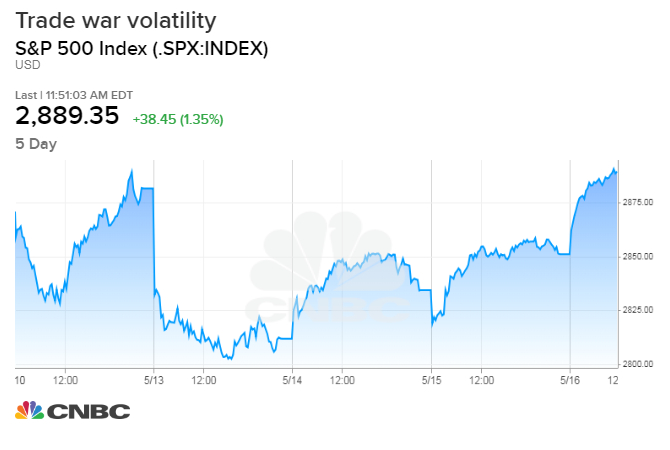
Your 30s are all about balance. Your career is starting to take off. You’re earning more, but then your expenses are likely be higher. You may be buying a house and starting a family, and neither of those is a cheap undertaking.
You need to balance income against expenses, and you need to start adjusting your vision from near-term goals to a longer time horizon. You may want to start saving for your kids’ education. You definitely want to start thinking about your own retirement.
In your 30s, you know your goals and you’ve hopefully mastered cash flow. Now it’s time to start saving for long-term goals, and that means investing, says Douglas Boneparth, a certified financial planner and president of Bone Fide Wealth in New York.
“To begin, set an initial target of 10% savings for retirement,” Boneparth said.
You may not get there immediately; it’s a target. To help increase savings, Boneparth says, focus on your career and find ways to make more money, such as putting in extra hours, working a side business and seeking out promotions and raises. “It’s amazing you’ve already done the other stuff,” he said.
Starting may be the hardest part
If he’d had money to invest as a college student in 2009, John Manuel, now 33, would have bought gold.
“I didn’t understand [that down markets are] the best time to buy,” he said. “I thought if everything was losing value, then a commodity would be more valuable.”
John Manuel, 33, says getting started is the hardest part of learning to invest.
Source: John Manuel
A relative newcomer to investing, Manuel, who works in transportation logistics in Dallas, started researching how to invest earlier this year. His main reason? “The whole idea of having any kind of security later in life seems to be dwindling if you don’t take it upon yourself to do that,” Manuel said.
People need to ditch their anxiety about losing money. That’s the excuse people use to avoid the stock market, and Manuel agrees. “I think the idea of losing money is scary,” he said.
All you need to do is look at the returns over time, though. “Index funds are great and return so much more than a savings account,” Manuel said. “It’s very surprising to many people.”
“There are so many reasons to invest,” he said. “The challenging part about investing is making that initial decision.”
Make a plan and stick to it. You’ll get the biggest reward from investing for the long term, Manuel says. Timing the market and watching day to day brings much greater risks, so buy and hold is his preferred strategy.
Here’s what to know
Start with some basics. Know the difference between before- and after-tax investing, between a traditional and a Roth individual retirement account, Boneparth says.
“Understanding the difference between stocks and bonds doesn’t automatically make you a good investor,” said Priya Malani, a founding partner at Brooklyn, New York financial planning firm Stash Wealth. Plenty of people understand the intricacies of various investments but are still bad at investing.
More from Invest in You:
What surprises people most about Roth IRAs
Here’s what it takes to become a 401(k) millionaire at any age
What people wish they’d done before a tragic accident
“Know that you cannot beat the market,” Boneparth said. Remember the best investors stick to their strategy even when things get wild.
Remember that you’ve got time on your side, Boneparth said, so “you can afford to be aggressive [and stay] mostly in equities.” Two other things to learn: diversification — being invested in a variety of equities — and the fees you pay on investments.
Malani says most people are relieved to learn the difference between gambling and investing. She knows investors have gotten the message when markets are down and they call asking to buy stocks. “Once we lay the groundwork, clients can see how easy it is to follow the hype and buy high, sell low,” she said.
Making the leap
Jeffrey Castilla, 38, was always interested in investing but wasn’t doing much about it aside from reading “Rich Dad, Poor Dad” by Robert Kiyosaki. Then, about a year ago, he was looking for something to read when he came across a thrift-shop copy of Kiyosaki’s “Cash Flow Quadrant.”
Jeffrey Castilla, 38, with his wife, Michelle, says time is the most important factor in successful investing.
Source: Jeffrey Castilla
That book caused him to finally take the plunge. “I realized I had some money saved and it wasn’t doing anything,” said Castilla, a market research analyst in San Antonio. “It felt like a waste.”
He began cautiously, but from the start Castilla had goals. Right now, he and his wife have seen their emergency fund balance hit $ 6,000. When they reach $ 10,000, Castilla intends to boost his 401(k) contribution to 10% of his income.
His interest in numbers, math and tracking — “I call it ‘nerding out,'” he said — came in handy when sorting through available videos and resources.
Whenever he found something confusing, Castilla stayed calm and listened carefully until he found a piece of information that resonated. One video mentioned using a fractional investing app, which lets you invest small amounts of money, instead of a savings account.
“I’m always reading, I’m always learning and growing,” Castilla said.
Currently he puts about 30% to 40% of what he earns into investing. He is thrilled with how well the money has done. “I track its growth monthly,” he said. “It’s fun for me to watch and nerd out and do calculations and see how much it grew this month.”
The top lesson he says he has learned: that time is more valuable than the money.
Castilla has this investing advice for newbies: “Start ASAP and be patient. Enjoy the learning process … and don’t freak out if your stock goes down.”
“If you put a large amount into one particular stock, protect yourself with a stop loss,” Castilla said. “Loss is part of the game, but if you pick good companies, the general trend is up.”
He’d like others to know that investing is much more accessible than the average person thinks it is.
Forget the Joneses
Don’t waste time comparing yourself to other people who are spending a lot of money. Ignore your friends, says David Schneider, a CFP and founder of Schneider Wealth Strategies in New York. “There’s a good shot they’re running up debt on a credit card, or someone else is funding them,” he said. “It might seem like they’re living the dream, but fast forward 20 years.
“It’s not going to look so fantastic for them.”
Don’t waste time comparing yourself to other people who are spending a lot of money. Ignore your friends.
Risk is your friend, Schneider says, provided you’re investing in sensible investments. “The stock market beats other investments over time because it invests in stocks, not despite investing in them,” he said. “It’s compensation for bearing risk,” he said.
Brace yourself for ups and downs. “Young investors can expect it to drop 30% to 50% once or twice a decade for the rest of their lives,” Schneider said. Just remember the stock market has historically beaten other investments, bonds and cash, even taking those drops into account.
Got goals?
Amit Patel, 34, credits his dad with serving as his financial role model. “He never told me specifically what to do,” said Patel, a management consultant in Farmington, Connecticut. He simply asked Patel about his goals and drilled a simple message: “His mantra was ‘save, save, save.'”
Amit Patel, 34, with his wife, Anu, says goal-setting is critical to getting where you want to be.
Source: Amit Patel
Patel, who has already paid down his $ 40,000 in student loans, says the best piece of advice he was given was to start early and to have a goal. “That’s the most important, the goals,” he said. “Why are you doing all this stuff?”
Never jump on the bandwagon, Patel says, even when you see everyone else doing something. It’s too tempting to give into momentarily impulses and moods. You put money into stocks, then the market falls, then you’re tempted to dump the stocks and flee the market. “It’s the opposite of what they’re supposed to be doing,” Patel said.
Whatever you do invest in, Patel says, you should know very well, as Warren Buffett says. Learning your investment backward and forward is a No. 1 rule.
Doing a Google search on an investment isn’t enough. Watching HGTV isn’t enough to get you into real estate investing. The home-flipping network makes it seem very easy.
“It’s not,” Patel said.
The hardest thing about investing, Patel says, was coming up with the capital in the first place, since the cost of living in Connecticut is high. “Buying real estate takes around $ 50,000 or $ 60,000 to buy a property,” he said. “You need to do your homework on the financing options.”
Lifestyle creep is a real danger, Patel says. “You want the better car, a nice watch, nice clothes,” he said. “At a certain point you can enjoy some material things, but you have to keep your lifestyle down to earth.
“You can’t have it keep going up and up and up.”
Check out 5 Money Lessons Everyone Should Know by Age 30 via Grow with Acorns+CNBC.
Disclosure: NBCUniversal and Comcast Ventures are investors in Acorns.






